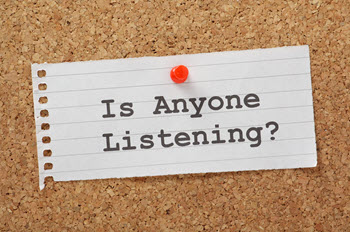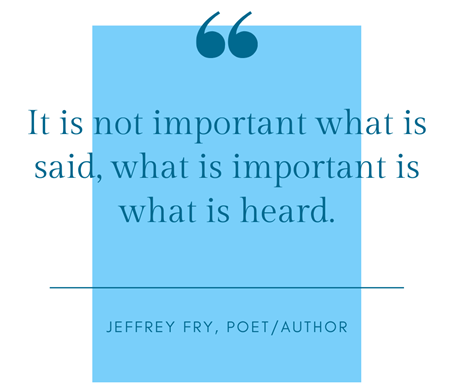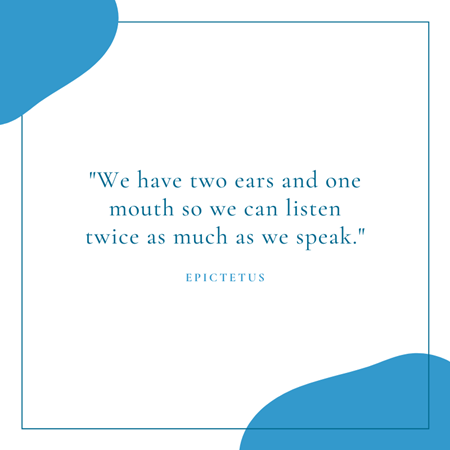 Being heard. How that concept has changed in 2020. When I first wrote this post in 2011, my intent was presenting the idea from a business communication perspective.
Being heard. How that concept has changed in 2020. When I first wrote this post in 2011, my intent was presenting the idea from a business communication perspective.
I find it quite humorous that back in 2011, I used the verb “Trumps” in the title. Another term that generates a much different response in 2020.
I decided to update this post to incorporate the #BlackLivesMatter movement as the black community hope and demand to be heard.
What does being heard really mean?
Being Heard
Like much of the world, I watched Oprah’s long-running talk show. One of my favorite lessons learned was our fundamental need to be heard – beyond the literal sense.
- Being heard tells us (and others) that we matter
- It validates us
- All of us
Now is the time for my white colleagues and I to listen. And that’s not always easy. Although we may have felt uncomfortable numerous times in the last several weeks, we need to hear what is being said.
Now is not the time to object or argue what we’ve heard.
When you acknowledge and share the need to be heard, words take on new meaning and depth.
Here’s how.
#1 – Being heard is understanding.
Imagine you’re giving a presentation. You open the floor to questions and receive a replay on aspects of what you said. Were you shocked at what audience members heard?
It happens more often than you think. We seldom ask others what they heard. And many of us do not listen past our own thoughts.
Social media provides a platform for acknowledging what someone wrote or said.
- Readers comment
- Surveys provide feedback
- Others share your words
Acknowledgement shows we understand what someone wrote or said means something to that person. Be thoughtful in how you respond.
- You don’t have to agree with the person
- But show you value what they shared
- Acknowledge you heard what they said
#2 – Being heard is listening.
Greek philosopher, Epictetus, offered this great line –
I like to believe that it also reminds us that listening is a two-way process.
If you listen to others, they will listen to you.
So, if YOU want to be heard, write with your ears to show your audience you are listening. That’s true for your professional and personal communication.
#3 – Being heard is the highest form of validation.
See if you can relate to this story. A friend of mine had breast cancer and disclosed how she felt after being diagnosed. In my attempt to empathize, I told her about what I thought was a similar experience (not cancer). My friend grew quiet and said, “It’s not about you.”
- Initially hurt, I soon realized I had not given her what she needed
- So, I responded, “You’re absolutely right.”
- I heard my friend
We all deserve to be heard. I will never pretend I understand the black community experience. I have not lived their lives. So, all my stories meant to relate, silence those who must be heard. Over the last several weeks, I have read many stories. The following are a few that hit home.
#BlackLivesMatter
Do better
Madison Butler, the Blue Haired Recruiter, responded on LinkedIn to the rash of corporate messaging campaigns regarding #BlackLivesMatter. These are a few of Madison’s points.
- Black trauma is not PR.
- If you are one of the companies with out a single Black person on your executive team or board but posted on Instagram. This is for you.
- If you are one of the companies who allows racism run rampant within your org because “we don’t talk about politics” but sent out an email campaign about #BlackLivesMatter. This is for you
- If you actively pay your Black employees less than they deserve yet sent out a heartfelt tweet about how much you donated. This is for you.
- If you allow leaders to push Black employees out by not checking their bias, yet had your HR team posting about inclusivity on Linkedin. This is for you.
And my personal favorite ~
- Stop using our trauma to raise brand awareness.
- Our Black lives matter, all of the time, not just when the world is watching.
- Do better.
Please, just #dothework
Those of us who know the truly outstanding work of Sharon Hurley Hall are appalled at the assumptions she’s endured – because she’s black. I appreciate Sharon on so many levels – professionally and personally – but I’ll let Sharon’s words do the talking. She’s so much better at it.
Sharon has recently released several articles on #BlackLivesMatter on Medium. I encourage you to seek them out. The first I read was I’m Tired (of Racism). Here is a small sample.
- I’m a Black woman, but sometimes I don’t speak about race and racism. Because I’m tired…
- I’m tired of the color of my skin being a reason to stop me from my daily rounds or, in the US, a mark of death.
- I’m tired of the double-take when I walk into an interview — my name could be that of a blue-eyed lass from Ireland. They weren’t expecting to see me. One colleague complained that my name “wasn’t African enough”.
- I’m tired of the reduced expectations — the people who think I’m of lesser intelligence (trust me, I’m not!)
- I’m tired of having to educate people who can read and learn about everything else in the world about white privilege, racism and history. Please, just #dothework
One of the most disturbing trends has been watching these gifted professionals being viciously attacked. All for sharing their truth.
Business as Usual
Despite going in a very different direction with this update, I was somewhat surprised I could use so much of this post’s original content. But, when I thought about it, that’s how it should be. Why?
- Because striving for better communication should be universal
- Whether in business or personal relationships, we could all do better
- We all need to please, just to do the work
Does that mean business as usual? I hope not.
=====================
Helping you Keep it simple, clear & uniquely yours
=====================
This June 11, 2020 post is an update to a post originally published on October 24, 2011.



I’d take being heard once, over 1000 likes too. People who can truly hear have an innate social skill that allows them to consider other people. As opposed to simply considering their own self-absorbed needs or likes. An important skill for personal and professional relationships.
Thanks for sharing your thoughts, Nicky. Listening was something I really had to work at. My mind would race with ideas that hit my mouth before they should.
I realized how rude it was and worked on developing my listening skills. Either that or my boomer brain has seriously slowed down.
😀
Great post, as usual, Cathy. Hope you like my tweet!
Thanks, Roy, for the comment and the creative Tweet – as usual. 🙂
That validation need is critical far too often. We do not believe that what we say is useful unless someone validates us but bottom line, we have the ability to make things happen for ourselves and the audience will come just as the teacher comes when you need to learn something
Interesting post and thanks for sharing Cathy
Thank you, Roberta, for a different perspective. Yes, you are right, we have to respect our own abilities as well as others. By the way, love your avatar. 🙂
Listen helps you be heard with great ease Cathy. Listeners are leaders with a loud and clear message many tune in to: I listen, I care. We like hearing this 😉
Thanks for sharing
RB
Thanks, Ryan. Glad you like hearing it and are heard. 🙂
Really listening, deeply, is an art and a practice. Thanks for the reminder.
One I have to work on every day, Anne. 🙂 Thanks for stopping by.
Cathy, thanks for including my words in this update. As always, your article is on point. I’m happy that so many more people are listening.
Thank you, Sharon, for sharing your stories. It’s important to hear.
The problem, as I see it, is that those of us who know changes are necessary already know this. Those that think ‘there is no institutional racism’, ‘there is no bias’, ‘I have no such problems’- they won’t read this or consider the facts.
I suspect you’re right, Roy, but this Pollyanna always hopes to reach some on at least a point or two.
Really listening is the most difficult skill to master! Let all the responses go! Be in the moment and take it in! Paraphrase back. Wait, be patient. It’s hard. Practice everyday. Great post Cathy.
It is hard, Lee. Especially when you’re discussing something you’re passionate about. Our increasingly short attention spans makes this skill challenging. Thanks for sharing your thoughts, Lee. Good to see you here. Hope you are safe and well.